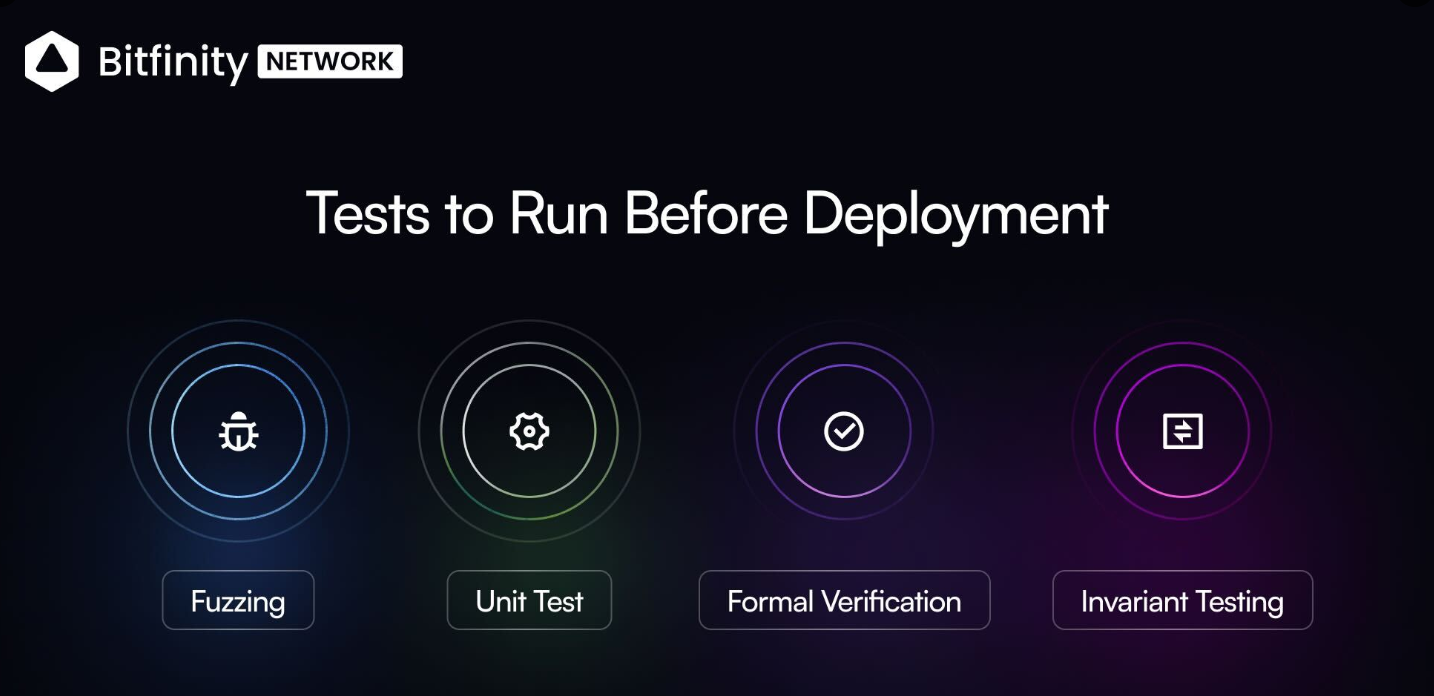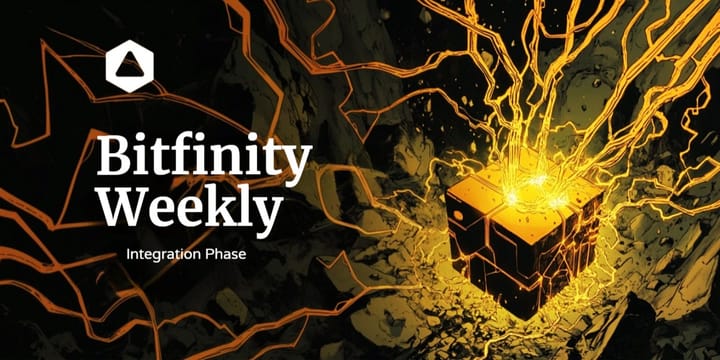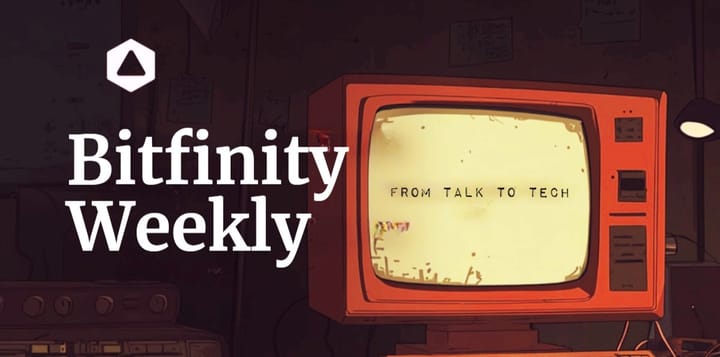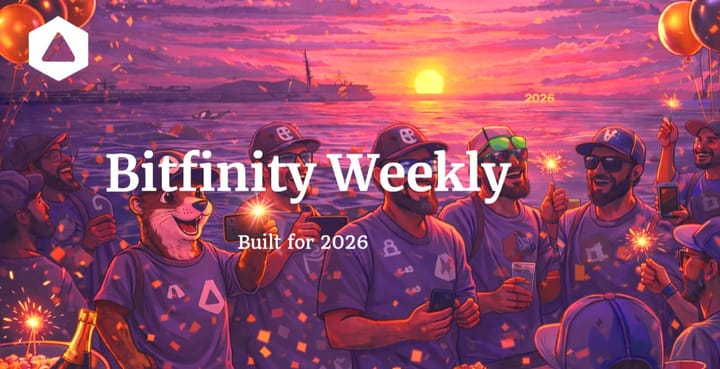Bitfinity Weekly: Decentralization Matters

Welcome to Issue #157 of Bitfinity Weekly for our #BITFINIANS community. If this newsletter was forwarded to you, sign up here.
What's in Today's Email?
- Bitcoin Bytes
- Global Crypto News
- In the IC
- This Week in our Blog
- Tweet of the Week
- Infographic Insights
- Meme Time
- A Matter of Opinion
Bitcoin Bytes
Core Moves: After many heated community discussions, Bitcoin Core developers have decided to remove the longstanding 80-byte limit on OP_RETURN outputs. This change will allow transactions to include larger amounts of arbitrary data and permit any number of OP_RETURN outputs by default. This could potentially be a boon to the Bitcoin DeFi ecosystem as the Runes format uses OP_RETURN outputs. Ordinal inscriptions and BRC-20 does not use OP_RETURN.
Li Fi Fo Fum: Bitcoin ecosystem dev lifofifo, of The Wizards of Ords, unveiled a new community tool: OP_SCRIPTIOns allows people to easily inscribe images on OP_RETURN outputs. The tool came into being after several notable figures in Bitcoin (like Bitcoin Wizard's Udi Wetheimer) joked about creating an inefficient NFT collection by storing images in reveal tx's OP_RETURN.
Moonwalking: Popular crypto payment infrastructure provider Moonpay has partnered with SatGo, an Ordinals trading platform, to enable users to purchase Ordinals, Runes, and Rare Sats using popular payment methods like Apple Pay, Venmo, and PayPal. This collaboration simplifies the process of onboarding newcomers to the Bitcoin ecosystem and also introduces offramping capabilities.
Sovereign State: New Hampshire became the first U.S. state to establish a strategic Bitcoin and precious metals reserve with the signing of House Bill 302 on Tuesday. A portion of state treasury funds will be used to invest in cryptocurrencies with a market capitalization of more than $500 billion; this limitation currently disqualifies all cryptocurrencies except for Bitcoin.
Global Crypto News
More of Everything: Ethereum's Pectra upgrade, its most significant overhaul since the 2022 Merge, went live this week. Combining the Prague execution layer and Electra consensus layer updates, it introduces 11 Ethereum Improvement Proposals (EIPs) aimed at enhancing user experience, staking efficiency, and Layer 2 scalability. Key features include smart accounts for more programmable wallets, a 64-fold increase in validator staking limits, and improved integration with Layer 2 solutions to double network efficiency.
24/7 Notification Alerts: Tokenized asset management firm Superstate is launching Opening Bell, a blockchain-based platform enabling SEC-registered public equities to trade directly on-chain, starting with Solana. This move aims to modernize equity trading by offering real-time, 24/7 transactions and programmable securities, moving away from traditional centralized exchanges and multi-day settlements. Canadian crypto firm SOL Strategies plans to be the first to list its shares on this platform, pending regulatory approval.
DeFi without the De: Coinbase has announced a $2.9 billion acquisition of Deribit, the world's leading digital options exchange specializing in Bitcoin and Ethereum derivatives. The deal comprises $700 million in cash and 11 million shares of Coinbase stock, marking the company's largest acquisition to date . This move aims to expand Coinbase's presence in the crypto derivatives market and strengthen its international footprint. Deribit's founders, John and Marius Jansen, will step down following the completion of the deal, which is expected by year-end.
In the IC
Decentralization Matters: Catch up on the latest episode of World Computer Tech Talks! Samuel Burri, VP of Engineering at the DFINITY Foundation, discusses how the Internet Computer achieves true decentralization through onchain governance, eliminating the middleman in frontend delivery, and more.
Flow State: The Internet Computer is not only its own ecosystem, it can also enhance other blockchains as well. LiquidiumFi's team explains how their Bitcoin Instant Loans work, and how they leverage the Internet Computer as an assistant to eliminate friction points in cross-chain interoperability. Watch the video here.
Speak Easy: Dominic Williams, founder of DFINITY, was interviewed by CCN.com, describing a future where AI and blockchain converge to democratize app development. Through the Internet Computer Protocol, AI models can run directly on-chain as smart contracts, eliminating reliance on centralized cloud services and enhancing trustless, censorship-resistant computing.
Tweet of the Week
EVM developers when they realize they can use their skillsets to build on Bitcoin with Bitfinity. pic.twitter.com/yU4o669Orl
— Bitfinity Network (@bitfinitynet) May 7, 2025
Infographic Insights
⚠️ Don’t Push Code Blindly—Test It First!
✅ Essential Tests You MUST Run Before Launching to Bitfinity Mainnet!

Meme Time

A Matter of Opinion
While traders and investors are celebrating this week's sudden bump in positive market action, legislation in the U.S.A. is getting hairy. The rift over American crypto policy seems to be growing wider between the Democratic and Republican parties, casting a shadow on the entire international crypto market.
This political tension came to a head on Wednesday during a scheduled Congressional hearing on digital asset regulation. The session, originally intended to review a draft framework for regulating cryptocurrencies and stablecoins, was derailed when House Democrats, led by Representative Maxine Waters, walked out in protest. Their concern: President Donald Trump’s growing ties to the crypto industry, which they argue raise major ethical and legal questions.
Trump and his family have become increasingly active in crypto ventures, with reported involvement in a stablecoin project, a Bitcoin mining operation, and even meme coins. At the same time, the president has publicly championed a pro-crypto stance and supported legislation that could benefit these very initiatives. Democrats argue this constitutes a serious conflict of interest, particularly when regulation is being debated that could directly affect the financial standing of the president’s businesses.
Without unanimous consent from both parties, the official hearing was cut short. Republicans, unwilling to pause proceedings, instead rebranded the event as a “roundtable,” continuing discussions without formal legislative weight. Meanwhile, Democrats have pulled support from related bills, including the once bipartisan GENIUS Act, demanding tougher anti-money laundering provisions, national security assessments, and rules to prevent elected officials from profiting off the crypto policies they help shape.
The GENIUS Act, which we covered in a previous week's edition in this very section, was poised to be one of the most bipartisan efforts to bring clarity to U.S. crypto regulation. Designed to establish a framework for stablecoin oversight, it aimed to balance innovation with safeguards against illicit finance and systemic risk. But this week's walkout by House Democrats has thrown it and the wider crypto regulatory momentum into question.

Connect with Bitfinity Network
Bitfinity Wallet | Bitfinity Network | Twitter | Telegram | Discord | Github

*Important Disclaimer: The information provided on this website is for general informational purposes only and should not be considered financial or investment advice. While we strive for accuracy, Bitfinity makes no representations or warranties regarding the completeness, accuracy, or reliability of the content and is not responsible for any errors or omissions, or for any outcomes resulting from the use of this information. The content may include opinions and forward-looking statements that involve risks and uncertainties, and any reliance on this information is at your own risk.
External links are provided for convenience, and we recommend verifying information before taking any action. Bitfinity is not liable for any direct or indirect losses or damages arising from the use of this information.





Comments ()